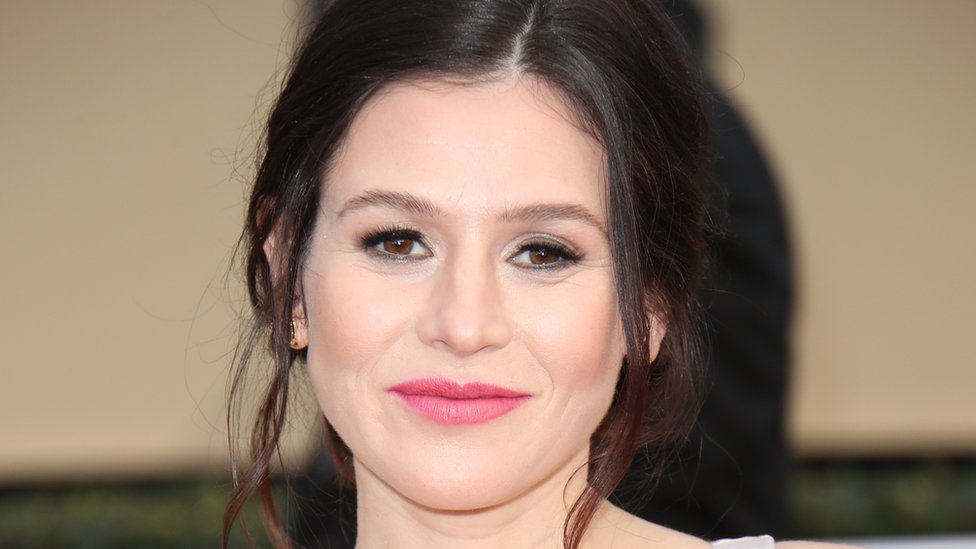
Image copyrightGetty ImagesImage caption Actress Yael Stone has accused her former co-star Geoffrey Rush of misconduct On Monday, Australia was transfixed by fresh sexual misconduct allegations against Geoffrey Rush - one of the nation's most celebrated actors.Australian actress Yael Stone alleged that Mr Rush behaved inappropriately towards her during a theatre production in Sydney in 2010-11.
Mr Rush, 67, has denied her accusations.Ms Stone, 33, said that she had feared speaking out because of personal and career reasons, echoing concerns raised by many women around the world since the #MeToo movement began last year.But she also raised concerns that she could face legal consequences - because under Australia's strong defamation laws, people or publications making allegations often face threats of legal action.Experts say worries like this are a key reason why the #MeToo movement has not gathered as much momentum in Australia as in many other nations.
High-profile casesMr Rush is currently suing a Sydney newspaper for defamation after it published allegations against him involving another actress, Eryn Jean Norvill.
Mr Rush denies wrongdoing.Image copyrightEPAImage caption Eryn Jean Norvill testified at a defamation trial in Sydney last month Ms Norvill did not speak to the newspaper and was not named in its reports, but she was publicly identified in the subsequent legal battle.
She later agreed to give testimony in the defamation case.But like two other women at the centre of prominent Australian cases of alleged sexual misconduct in the past year, Ms Norvill had never wanted her experience to be known publicly.Last month, Luke Foley resigned as New South Wales state opposition leader over allegations that he groped a woman at a bar in 2016.
They were first raised publicly by a political rival under parliamentary privilege - a method that affords additional legal protection.But alleged victim Ashleigh Raper, an Australian Broadcasting Corporation journalist, had wanted to remain anonymous.
She only identified herself publicly in a bid to help resolve "ongoing media and political interest"."It is clear to me that a woman who is the subject of such behaviour is often the person who suffers once a complaint is made," Ms Raper wrote in a statement.Image copyrightEPAImage caption Luke Foley resigned as New South Wales opposition leader last month Mr Foley denies the allegations.
He resigned within hours of Ms Raper's statement and said he would begin a defamation action, but later decided against proceeding.In February a businesswoman, Catherine Marriott, made a confidential complaint about Barnaby Joyce, Australia's former deputy prime minister, accusing him of sexual harassment.It was later leaked to media outlets when Mr Joyce faced a political storm over his affair with an ex-staffer.
Mr Joyce said he considered the allegations "spurious and defamatory", but did not launch legal action.In another high-profile case, actor Craig McLachlan is suing two Australian media outlets and a former co-star for raising allegations of sexual misconduct against him.Mr McLachlan, a star of TV shows including Home and Away and The Doctor Blake Mysteries, has denied accusations by three women.Silencing effectAccording to the Australian Human Rights Commission, one in three Australian workers have been sexually harassed in the past five years.But of those workers, fewer than one in five made a report or a complaint.
Experts say that's down to a multitude of reasons."Among other concerns, women may be concerned about the security of their jobs, becoming the target of community gossip, being labelled a 'troublemaker' or a 'liar'," says Dr Skye Saunders from the Australian National University.She says the #MeToo movement has helped to tackle such challenges.
But she also believes that Australia's conversation has been muffled by defamation laws.Australia puts the legal onus on a person making allegations to prove that they are true.
This is different to the US, for example, where the onus is on the accused person to prove an allegation was made with malice."Women in Australia have to be more wary than our sisters in the United States, given the intersections of defamation laws and the #MeToo movement," Dr Saunders says.Discrimination law researcher Dr Karen O'Connell calls it "striking" that in the past year, no prominent cases have been brought under Australia's sexual harassment laws."Instead, there have been high-profile defamation cases, or other people taking women's situations and running with it themselves.
That's really concerning," says Dr O'Connell, from the University of Technology, Sydney.Image copyrightAFPShe also believes that the adversarial nature of defamation cases - the "he said, she said" discourse - skews that public conversation."Instead of the talk being about how to make people feel safe in workplaces, it becomes instead this narrative about women bringing down men in powerful positions," Dr O'Connell says.
"And that's not what #MeToo is about."

 17
17







